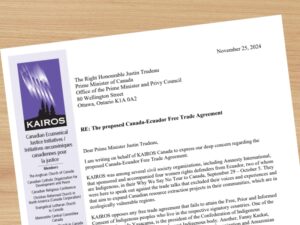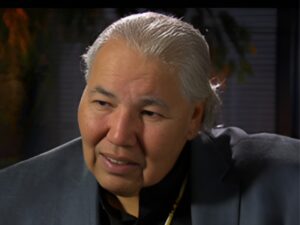Joint Review Panel report on proposed Northern Gateway Pipeline Project downplays Indigenous and ecological concerns

The joint review panel appointed by Environment Canada and the National Energy Board has recommended that the Enbridge Northern Gateway pipeline project be allowed to proceed as long as it meets 209 required conditions.
The panel’s endorsement comes despite the fact that 96% of written submissions and 1159 presenters spoke out against the project; only two presenters were in favour of the pipeline.
The report appears to fall short of the test established by the Anglican Bishops of British Columbia and the Yukon who in 2012 urged serious study of the concerns of Indigenous communities and stated “In a project of this magnitude, it is imperative that the final [report] … be credible and command wide public support.”
As Grand Chief Stewart Phillip, President of the Union of B.C. Indian Chiefs said “Today’s recommended approval with conditions stems from a fundamentally and fatally flawed process where as a matter of record, the overwhelming majority of presentations made to the Panel here in B.C. expressed grave concerns, distressing facts and a shared belief the project should not proceed. The Northern Gateway Project is being vehemently opposed by Indigenous Peoples who will not put their territories, waters and communities at risk.”
The report downplays Indigenous peoples concerns about the disastrous consequences of a large oil spill like the one that dumped nearly one million gallons of diluted tar sands bitumen from an Enbridge pipeline into the Kalamazoo River in Michigan in 2010. The panel says such a spill is “unlikely” and its “adverse effects would not be permanent or widespread.”
While the report gives weight to Enbridge’s offer to loan money to Aboriginal groups to purchase equity in the pipeline in the hope of sharing in future profits, it ignores the stated positions of native leaders such as Chief Larry Nooski of the Nadleh Whut’en First Nation who has declared “Our lands and waters are not for sale, not at any price.” Similarly, Pete Erickson, a councillor from the Nak’azdli First Nation told Enbridge’s annual meeting “We do not want your money. … I’m asking you … [to] respect our traditional law governing our own lands for us to determine our own future.”
Respect for Indigenous Peoples right to give or withhold free, prior and informed consent before a resource project of this magnitude can proceed across their territories is a fundamental principle of justice. This right is enshrined in the UN Declaration on the Rights of Indigenous Peoples, which has been endorsed by the Government of Canada.
Similarly, the need to curb greenhouse gas emissions to prevent runaway climate change is a fundamental principle of ecological integrity. But the panel’s narrow terms of reference allowed it to ignore the consequences for the climate of increased bitumen extraction. Building a pipeline with the capacity to export up to 525,000 barrels a day of diluted bitumen necessarily involves a substantial expansion of tar sands operations.
Since 2010 KAIROS has called for a halt to new approvals for tar sands projects. If current plans for expansion of tar sands production proceed, by 2020 they will add an additional 72 megatonnes (Mt) of carbon dioxide to the atmosphere relative to 2005 emission levels. This would more than cancel out the 67 Mt of reductions expected from Canada’s other industry sectors and make it impossible for Canada to meet even its modest emission reduction target. In addition to the added greenhouse gases that would be emitted within Canada, if the Northern Gateway pipeline were to operate at capacity, combustion abroad of the oil it would carry would add another 82 Mt of carbon dioxide to the atmosphere each year.
For background information see our Ethical Reflections on the Northern Gateway Pipeline at http://www.kairoscanada.org/wp-content/uploads/2012/07/SUS-RE-NorthernGatewayEthicalFramework.pdf












